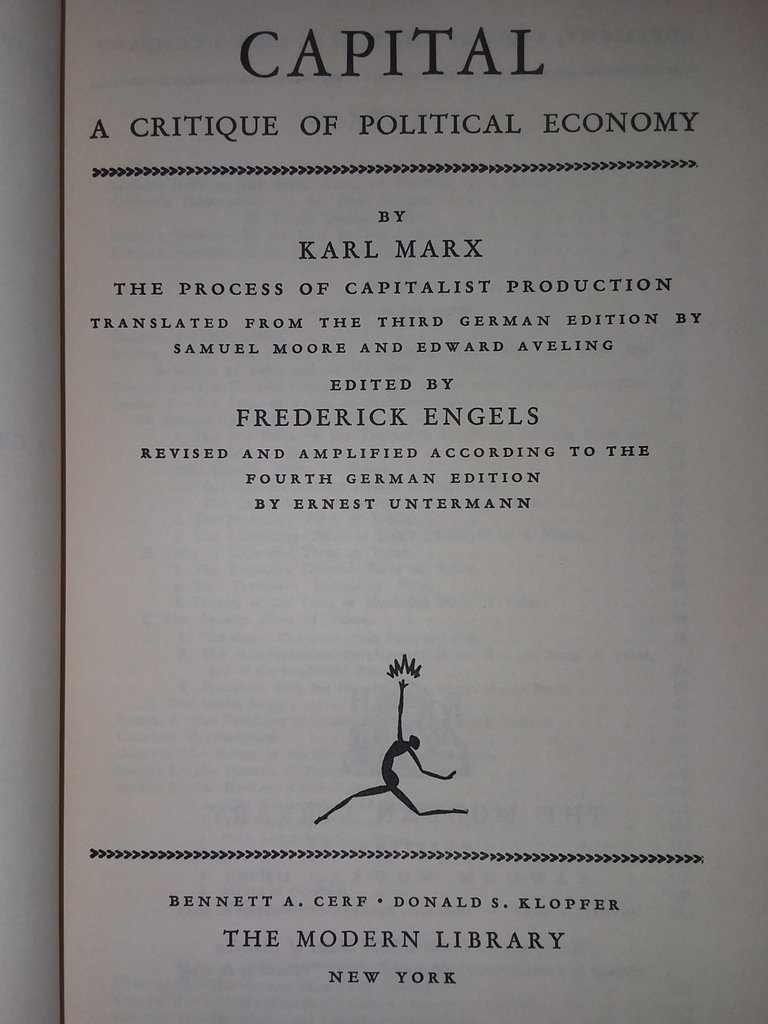I have a copy of Capital: A Critique of Political Economy by Karl Marx sitting on my shelf, and I am long overdue to read it. This is a Modern Library edition published by Random House, and it bears a copyright of 1906.

As an American who grew up at the end of the Cold War, I saw negative depictions of Marxism everywhere in media and politics even though I wasn't really politically aware in any real sense until well after the Soviet Union dissolved. In the years since, I have heard many explanations for the collapse. Self-professed Marxists often argue the USSR betrayed the principles of socialism, and Stalin was more of a state capitalist than a revolutionary comrade. Others blame reactionaries for causing the noble venture to rot from within before it could blossom into a true worker's paradise. The jingoistic insist Ray-Gun's militarism called the Soviet bluff, and they had to fold. Some say it was grassroots subversion via samizdat, bootleg movies, smuggled blue jeans, and rock & roll that weakened the power of the State over the individual. Others describe the destructive economic and political outcomes as inherent flaws in central planning.
My prejudice leans toward the explanations and criticisms put forth by Austrian economists like Ludwig von Mises. I suspect Marx is largely correct in identifying flaws in 19th century European society. The Prussians, the Austrians, the French, the British, the Russians, and even the Dutch were all vying for imperial power. Monarchy was still the predominant political system, and mercantilism defined imperial economic policies. Where I suspect I will find fault with Marx is more in his diagnosis of cause and his proposed solutions. As in modern political discourse, problems are easy to see, but cause and remedy are hotly disputed.
I do not intend to criticize Marx for his personal faults. I would like to address the idea, not the man. I also intend to do my best to avoid taking quotations out of context or mischaracterizing the arguments in question. I am also well aware that I may misunderstand the arguments presented, and something may have been lost in translation when this was published in English. But this is supposed to be written for the common man, is it not?
Do you think this is a worthwhile venture? Would you like to get your own copy and follow along for discussion and debate? It appears Google has a digital version of my edition. Please comment below if this piques your interest!
Expect the first proper entry... eventually. I make no promises as to a schedule.
If everyone used this base line as a standard for cognitive thinking, the world would be in better shape.
But some people can’t have opinions on certain things because maybe they have a dick, or they don’t. Or they’re white, and not black. Or they’re young, and not old, etc.
I’m looking forward to reading your thoughts.
The problem i have with Marx's theories is very meta.
He breaks down the world into two classes, and heaps all the blame on one of them.
However, he misses a third class, and in doing so, fails to identify actual solutions that work.
The entrepreneur. The inventor.
Sure, when you have a working factory, its easy to point out that the workers are getting next to nothing (99% of the revenue, split 990 ways) and the owners are getting everything (1% of the revenue)
But the reality is the factory doesn't exist without the third class creating it out of nothing.
And socialism / communism does its best to destroy this third class. One by making it economically unviable, the other by just killing them.
Then there is the class theory that divides the world between the political class and the economic class. The former operates by real plunder, not the "exploitation of the worker" charged by the communists with their fixed pie fallacy. The latter engages in voluntary exchanges that build wealth.
Countering the Marxists' criticism of the Soviet Union is very difficult, because every argument they make is technically correct (assuming that they are working with an accurate account of Soviet history, some don't), it's just that they're non-sequiturs. In fact, I would argue that the only reason the Soviet Union lasted as long as it did is precisely because the Soviets kept tweaking the economic system, continually introducing more capitalistic elements into it to delay the inevitable collapse. Had the Soviet Union remained static, it probably would have collapsed circa 1970.
Still, I welcome this little venture of yours. This is one of the few pieces of Marxist "literature" that I haven't read. If it ultimately proves successful, you may want to move on to Kropotkin (which I know you've already read some of) or Trotsky next.
I suspect I will find myself a lot more in agreement with Proudhon. From what I have read of his work, the "Property is theft" argument is a lot more nuanced than the usual quoter thinks.
The usual quoter never gets past the title, I've found. People also tend to forget that it was written in 1840, when slave labour in the U.S. was responsible for supplying Europe with cheap cotton - rather like how slave labour in China and southeast Asia is responsible for supplying cheap everything to Europe and America today. Historical context matters just as much, if not more, than the author's original intent.
Yeah, slave labor, mercantilism, literal feudalism, and land/title grants are not the same as Lockean homesteading.
Congratulations @jacobtothe! You have completed the following achievement on the Hive blockchain and have been rewarded with new badge(s) :
You can view your badges on your board and compare yourself to others in the Ranking
If you no longer want to receive notifications, reply to this comment with the word
STOP